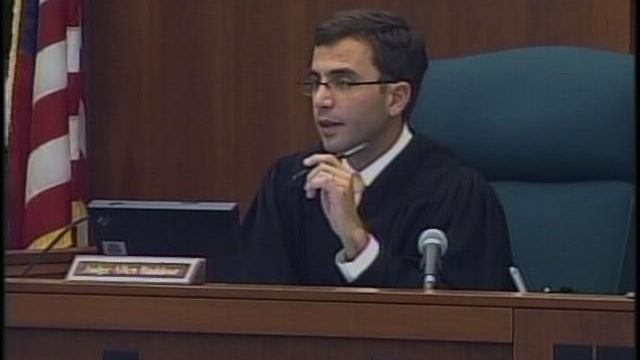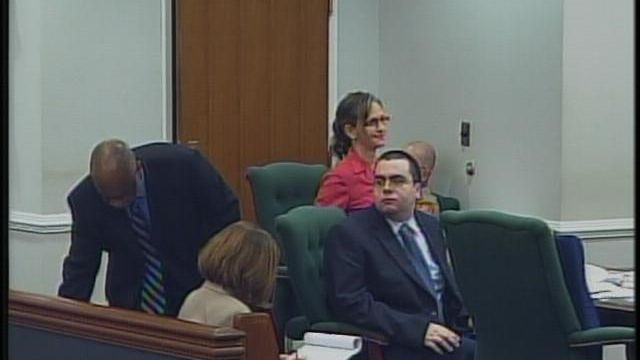Jury considering Orange County school shooter case
Alvaro Castillo, 22, is charged with killing his father, and then driving to Orange High School with a cache of weapons and opening fire. Deliberations are expected to resume Friday morning.
Posted — UpdatedAlvaro Castillo, 22, is charged with killing Rafael Huezo Castillo, on Aug. 30, 2006, and then driving to Orange High School with a cache of weapons and opening fire. Two students were injured in the school shooting, which ended when school personnel tackled the gunman.
He has pleaded not guilty by reason of insanity to all charges.
Orange County District Attorney Jim Woodall said Alvaro Castillo planned the attacks to gain notoriety.
"He wants fame. He's got to kill somebody, and he's got to do in a way that gets attention. Only thing he can come up with is the thing that has interested him for a long time: school shootings, mass murders," Woodall said.
Alvaro Castillo’s defense attorney, James Williams, countered that argument with an explanation of how Castillo’s “delusional belief” led to the acts.
“I’ll be the first to admit, a lot of planning went into this,” Williams said. “All the planning was driven by this delusional belief that this had to be done.”
“The premise that someone sick or delusional can’t plan is totally untenable,” Williams argued.
He said Alvaro Castillo was goal focused. He had a "false, fixed belief that God wants him to do certain things and that relates to sacrificing his family and sacrificing children at Orange High School," Williams said.
“He had to get done what he felt God wanted him to do.”
Woodall countered with excerpts from the suspect’s journal, in which he wrote that he knew he would need to ask God for forgiveness. “Why do you say ‘God forgive me’ if you’re doing what God’s directing you to do?” Woodall asked.
"He did not know the difference between right and wrong,” Williams said. “Indeed, he thought what he was doing was the right thing."
Williams said Alvaro Castillo developed a mental illness to "psychically survive" abuse from his father against himself, siblings and mother.
Attorneys sparred over one example of abuse – that Rafael Castillo forced his children eat fruits and vegetables. While Williams said that Rafael Castillo beat his children when they didn't vegetables, Woodall asked, "How much was he enforcing his beliefs about what they eat if his son weighs 195 pounds (in seventh grade)?"
Alvaro Castillo deliberately "manipulated" and "deceived" his mental health providers so they wouldn't latch onto his homicidal desires, Woodall said. "He knows if he tells people too much they're going to stop him," he said.
Since "there's no question" Alvaro Castillo committed the shootings, the defense "demonized" Rafael Castillo and exaggerated physical and verbal abuse by Rafael Castillo, Woodall claimed.
"They've got to create a situation where his murder is a little more palatable to you. The way to do that is to turn him into a demon," he said.
The slaying of Rafael Castillo was violent revenge, Woodall argued. He referred to a statement from Alvaro Castillo's mother, Vicky, that he shot his father multiple times to make sure he didn't suffer and end up in a vegetative condition.
"Shooting dad six times, seven times, while in a totally defenseless position, that's, ‘I'm getting back at you for things you've done to me.’ That's not, ‘I don't want you to suffer.’ That's ‘I'm (angry) at you, and I'm going to show you: bang, bang, bang,’" Woodall said.
Defense attorneys urged jurors not to consider the slaying of Rafael Castillo and the school shooting as part of the same event. The abuse and mental illnesses are mitigating factors that could justify lowering the charge to second-degree murder, they argued.
"Rafael Castillo was not killed as some incident or byproduct of another felony," defense attorney Phoebe Dee said. "He was shot in the course of being shot."
She concluded, "The question, ladies and gentleman, is whether or not he was insane at the time these events occurred or whether or not he had diminished capacity. Everything else, I would argue, that the state is going to talk to you about is this white noise; it’s distraction."
• Credits
Copyright 2024 by Capitol Broadcasting Company. All rights reserved. This material may not be published, broadcast, rewritten or redistributed.






